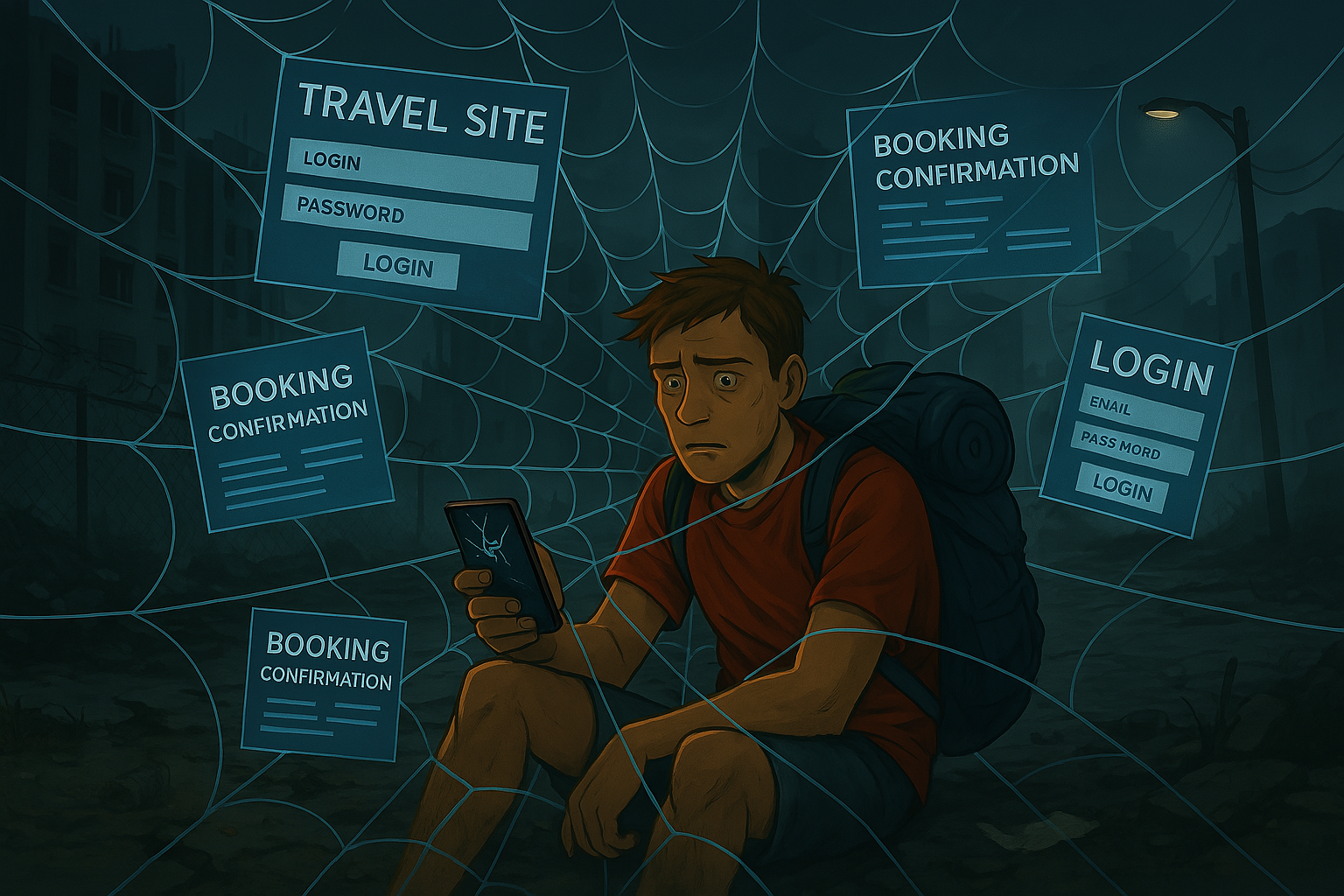As the world becomes increasingly digital, booking travel online has never been easier. However, with convenience comes risk. Scam travel websites are an emerging threat, preying on eager travelers looking for deals on flights, hotels, and vacation packages. As an experienced travel blogger, I’m passionate about ensuring you’re equipped with the knowledge to protect yourself from these fraudulent schemes. Let’s dive into the nature of this threat, who’s behind it, and how you can stay safe while planning your next adventure.
The Rising Threat of Scam Travel Websites
Scam travel websites are fake booking sites that pretend to be real travel agencies. These websites often promise very low prices or special deals to get you to give them your information or pay for trips that do not exist. Once you pay or share your personal details, the scammers disappear, and you get nothing in return.
These scams can cause serious problems. You might lose a lot of money and be left without a trip. It can also be stressful and disappointing when your travel plans suddenly fall apart. If scammers steal your personal information, you could also face identity theft and other long-term financial problems. Travel scams are becoming more common, especially during busy travel seasons when people book trips quickly.
Scammers set up convincing fake travel sites with ease. They often:
- Use logos and pictures copied from real travel agencies
- Offer very cheap flights, hotels, or travel deals
- Disappear after you pay, leaving you with nothing and no way to contact them
Many people only realize they were scammed when they get to the airport or hotel and there is no booking—sometimes weeks after their credit card was charged. Stay alert, and double-check travel sites before making any payments.
Fraud on the rise…
Fraudsters are increasingly targeting the earliest stages of trip planning, exploiting the eagerness to secure deals. A report from the Mastercard Economics Institute, based on anonymized credit-card transaction data, shows that in 2024 the fraud rate during trip planning jumped by over 12% compared to 2023. Peak-season destinations saw even sharper spikes: summer hotspots experienced an 18% uptick in fraud attempts, while winter locales saw a 28% surge during their peak months.

Beware fake ads…
Cybersecurity companies warn that deceptive online ads are a major vector for these schemes. Researchers at Malwarebytes discovered malicious ad campaigns that redirect travelers to counterfeit booking sites. Once there, victims encounter “fake” CAPTCHA prompts that, when copied and pasted, execute hidden code on their devices—installing malware that steals credentials and financial data before disappearing without a trace.
More opportunity these days for bad actors
Fraud rates during the trip-planning phase have surged not only because scams are more sophisticated but also due to broader economic and technological shifts. Inflation and economic uncertainty have travelers hunting for bargains, and that pent-up demand makes “too-good-to-be-true” offers all the more tempting. At the same time, the shift to online bookings has exploded—global online travel sales reached an estimated $475 billion in 2022 and are projected to top $1 trillion by 2030. High transaction volumes, seasonal peaks, and pressure to lock in deals quickly give fraudsters plentiful opportunities to intercept bookings with fake confirmations, manipulated photos, or false cancellation notices.
Several specific factors underlie the uptick in travel-planning fraud:
- Economic pressures: Consumers eagerly seek steep discounts, making them less cautious when a “limited-time” deal appears.
- Mass digital adoption: Mobile apps, social-media ads, and price-comparison engines increase the points of entry for scams.
- Seasonal surges: Summer and winter holiday rushes see fraud attempts spike by over 18 percent and 28 percent, respectively, at popular destinations.
- Ease of site creation: Low-cost web-hosting and no-code site builders let scammers launch convincing fake agencies in minutes.
Artificial Intelligence is having an impact
Artificial intelligence has become a force multiplier for travel scammers, automating and scaling deception like never before:
- AI-generated imagery: Scammers create photorealistic rental or resort photos using Midjourney, DALL·E, or Stable Diffusion, then post them on bogus listings—Booking.com reports a 900 percent jump in scam complaints as these AI tools proliferated.
- Fake reviews by the thousands: AI can spin out glowing, detailed testimonials en masse. Some research notes fake airline review counts soaring by 189 percent, and Tripadvisor removed over 2 million suspect entries in 2024 alone.
- Chatbot impersonation: Malicious AI chatbots, embedded via email links or pop-ups, pose as customer-service agents offering cut-rate packages, then harvest personal and payment data under the guise of “confirming your reservation”.
- Programmatic ad hijacking: AI bots automate targeted ad buys across platforms. They inject malicious redirects into otherwise legitimate ads, funneling users to counterfeit booking sites that capture credit-card details and IDs before disappearing without a trace.
By blending economic drivers with AI-enabled tactics, these operators can flood the market with fraudulent offers, outpacing traditional detection methods and preying on travelers’ urgency and trust.
Who are the Threat Actors?
The perpetrators behind scam travel websites are often organized cybercriminals or opportunistic individuals looking to exploit the trust of travelers. These threat actors use sophisticated tactics, such as creating polished, professional-looking websites that closely resemble well-known travel brands. They may also employ phishing emails, fake advertisements, or social media promotions to drive traffic to their fraudulent sites.
Many of these scammers operate internationally, making it difficult for authorities to track and prosecute them. They often target vulnerable groups, such as budget-conscious travelers or those unfamiliar with online booking processes. Understanding that these actors are skilled in deception is the first step to avoiding their traps.
In particular, scam travel sites are most likely run by a mix of:
- Organized cyberfraud rings that target high-volume bookings
- Small-scale operators seeking quick profits from one-off victims
- Affiliate marketers who knowingly—or unknowingly—promote shady offers
These actors exploit urgency (“Last rooms!”), social proof (fake reviews), and stolen branding to appear credible.
Tips to Identify Scam Travel Websites
To protect yourself from falling victim to these scams, here are some actionable tips to spot fraudulent travel sites:
Check Contact Information: Legitimate companies provide clear contact details, including phone numbers and physical addresses. If a site only offers a generic email or no contact options, it’s likely a scam.
Check the Website URL Carefully: Scammers often use URLs that look similar to legitimate sites but have slight misspellings or unusual domain extensions (e.g., .xyz instead of .com). Always double-check the web address before entering personal information.
Look for Secure Connections: Legitimate websites use HTTPS (look for the padlock symbol in the browser bar) to encrypt your data. If a site lacks this or displays security warnings, steer clear.
Be Wary of Unrealistic Deals: If a deal seems too good to be true, it probably is. Compare prices with trusted platforms to gauge if the offer is realistic. Cross-check prices and itineraries. Deals that undercut major providers by more than 30 percent usually warrant deeper research. Use established aggregators like Skyscanner or Kayak to compare rates.
Research the Company: Search for reviews or complaints about the travel website on independent platforms. Lack of credible feedback or a history of negative reviews can be a red flag. Search for “[Site Name] + scam” and scan forums like TripAdvisor or Reddit for firsthand accounts. Avoid testimonials hosted exclusively on the same domain. Verify contact details and ownership. Call or email the listed number; phishing sites often use disconnected lines or generic VoIP services. Confirm a physical address—copy–paste it into Google Maps to see if it exists.
Avoid Upfront Payments via Unsecure Methods: Scammers often request payment through wire transfers, gift cards, or cryptocurrency, which are difficult to trace. Stick to credit cards or secure payment gateways for better fraud protection.
Questions to Ask Before You Book
When evaluating a travel website, asking the right questions can help uncover potential fraud. Here are some key questions to consider before you book:
- Is the website affiliated with recognized travel associations? Legitimate travel agencies often belong to organizations like the International Air Transport Association (IATA) or the American Society of Travel Advisors (ASTA). Ask for proof of accreditation.
- Can they provide verifiable references or testimonials? Request specific customer feedback or references that you can independently verify.
- What is their refund or cancellation policy? Scam sites often have vague or nonexistent policies. A legitimate company will have clear terms and conditions.
- Are their payment methods secure and traceable? If they push for unconventional payment methods, question their legitimacy.
- Do they pressure you to book immediately? Scammers often create a false sense of urgency. A reputable site will allow you time to make an informed decision.
- Can I find the same itinerary on another reputable site?
- Does the website owner respond promptly and professionally to inquiries?
- Are customer service contacts reachable during business hours?
By pausing to ask these questions, you buy yourself time to research and avoid impulse purchases.
Resources for Reporting and Verifying Suspicious Websites
If you suspect a travel website is fraudulent or have already been a victim, reporting the incident is crucial to protect others and potentially recover losses. Below are some trusted resources where you can report scams or verify the legitimacy of a website:
- Federal Trade Commission (FTC): File a complaint about fraudulent travel websites and get guidance on next steps for U.S. residents.
- Internet Crime Complaint Center (IC3): Report cybercrimes, including online travel scams, to the FBI’s dedicated platform.
- Better Business Bureau (BBB) Scam Tracker: Report scams and check if others have flagged the website as fraudulent.
- Google Safe Browsing: Use this tool to check if a website has been flagged for deceptive practices.
- For International residents, report online scams and fraud to your national reporting center, such as Action Fraud (UK) or Australia’s ScamWatch.

Protect Your Identity and Financial Data
Use a Virtual Private Network (VPN)
Always funnel your browsing and bookings through a reputable VPN. A VPN encrypts your connection on public Wi-Fi—common at airports and hotels—so cybercriminals can’t intercept passwords or credit-card details.
Limit Your Digital Footprint
- Disable unnecessary app permissions and advertising IDs on your devices (location, camera, contacts) to reduce tracking.
- Turn off auto-connect for Wi-Fi and Bluetooth to prevent your device from joining unknown networks without consent.
- Avoid posting real-time updates or photos of your itinerary on social media—thieves can piece together your travel plans.
Leverage Credit Cards for Added Protection
- Notify your bank and credit-card issuers of your travel dates and destinations at least 72 hours before departure to prevent legitimate transactions from being flagged or declined.
- Use virtual credit-card numbers or one-time–use tokens (offered by many issuers) to limit exposure if a site is compromised.
- Set up real-time text or push notifications for all card transactions; small test charges often precede major fraudulent purchases, and a quick lock can halt the attack.
- Favor credit cards over debit cards—credit issuers generally offer stronger consumer protections and dispute processes.
Pre-Travel Card Preparations
- Create a dedicated “travel wallet” in your banking app. Only load the cards you need for the trip.
- Establish low daily spending and ATM withdrawal limits to cap potential losses.
- Save backup card details and your bank’s international hotline in a secure password manager—accessible even if your phone is lost or stolen.
By combining vigilant site-verification practices with strong digital hygiene and credit-card safeguards, you’ll dramatically reduce your risk of falling victim to scam travel websites—so you can focus on enjoying your journey with confidence.
Final Thoughts
Scam travel websites are a growing menace, but with vigilance and the right knowledge, you can protect yourself from falling victim. Always scrutinize websites for signs of fraud, ask probing questions, protect your data and use trusted resources to report suspicious activity. By staying informed and cautious, you can enjoy the excitement of planning your next trip without the fear of being scammed.
Summary of Key Points: Be cautious of unrealistically cheap deals, verify website URLs and security, research companies thoroughly, use secure payment methods, and report suspicious sites to authorities like the FTC or IC3. Safe travels!





